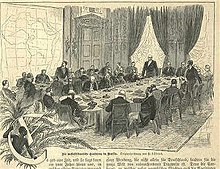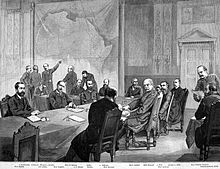
Back Koloniale Konferensie van Berlyn Afrikaans مؤتمر برلين (1884) Arabic Conferencia de Berlín AST Берлінская канферэнцыя (1884) Byelorussian Берлинска конференция Bulgarian Kuzuliadeg Berlin Breton Conferència de Berlín Catalan Berlínská konference Czech Berlinkonferencen (1884-85) Danish Kongokonferenz German


The Berlin Conference of 1884–1885, met on 15 November 1884, and after an adjournment concluded on 26 February 1885, with the signature of a General Act,[1] regulating the European colonization and trade in Africa during the New Imperialism period.
The conference was organized by Otto von Bismarck, the first chancellor of Germany, at the request of Leopold II of Belgium.[2] The General Act of Berlin can be seen as the formalisation of the Scramble for Africa that was already in full swing.[3] Some scholars, however, warn against an overemphasis on its role in the colonial partitioning of Africa, and draw attention to bilateral agreements concluded before and after the conference.[4][5][6] According to a 2024 study, the conference only set the borders for the Congo region (those borders were later revised).[7] The study finds that "most of Africa’s borders were not initially formed until after the 1884–85 Berlin Conference... most did not take their final form until over two decades later."[7]
The conference contributed to ushering in a period of heightened colonial activity by European powers, once made the point that the Berlin Conference of 1884–85 was responsible for "the old carve-up of Africa". Other writers have also laid the blame in "the partition of Africa" on the doors of the Berlin Conference. But Wm. Roger Louis holds a contrary view[which?], although he conceded that "the Berlin Act did have a relevance to the course of the partition" of Africa. Of the fourteen countries being represented, seven of them – Austria-Hungary, Russia, Denmark, the Netherlands, Sweden–Norway, the Ottoman Empire and the United States – came home without any formal possessions in Africa.
- ^ The Belgian Congo and the Berlin act, by Keith, Arthur Berriedale, 1919, p. 52.
- ^ De Belgische Koloniën - Documentaire over het Belgisch Koloniaal Rijk (English: The Belgian Colonies - Documentary on the Belgian Colonial Empire) timestamp 10:40 to 10:52)
- ^ Bruce Gilley: In Defense of German Colonialism, September 1, 2022
- ^ Katzenellenbogen, S. (1996). "It didn't happen at Berlin: Politics, economics and ignorance in the setting of Africa's colonial boundaries.". In Nugent, P.; Asiwaju, A. I. (eds.). African Boundaries: Barriers, Conduits and Opportunities. London: Pinter. pp. 21–34.
- ^ Craven, M. (2015). "Between law and history: the Berlin Conference of 1884–1885 and the logic of free trade". London Review of International Law. 3: 31–59. doi:10.1093/lril/lrv002.
- ^ Cite error: The named reference
Crowewas invoked but never defined (see the help page). - ^ a b Paine, Jack; Qiu, Xiaoyan; Ricart-Huguet, Joan (2024). "Endogenous Colonial Borders: Precolonial States and Geography in the Partition of Africa". American Political Science Review: 1–20. doi:10.1017/S0003055424000054. ISSN 0003-0554.
© MMXXIII Rich X Search. We shall prevail. All rights reserved. Rich X Search